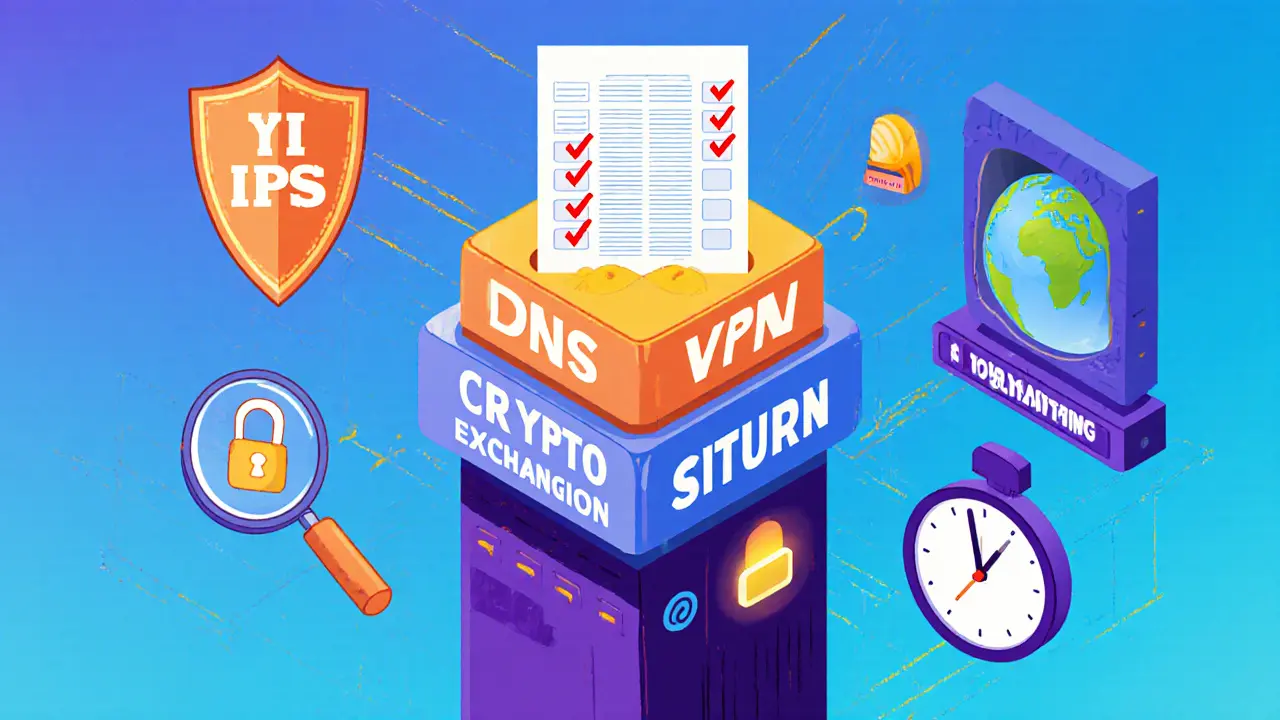VPN Detection Risk Calculator
Calculate Your Detection Risk
Select your VPN service and crypto exchange to see your estimated detection risk percentage.
Ever tried to trade crypto from a country where the government says “no‑no” and got blocked instantly? You’re not alone. Exchanges are getting smarter about stopping users who hide behind Virtual Private Networks (VPNs), and they’re using a stack of tech tricks to catch you. This article breaks down exactly how that works, why it matters, and what you can do about it.
What is VPN detection by crypto exchanges?
VPN detection by crypto exchanges is a set of technical and behavioral checks that trading platforms run to spot connections coming from VPN services. The goal? To obey local regulations and keep regulators happy while still letting legitimate users trade.
Why exchanges bother
Regulators in China, Russia, Turkey and many other places have made it clear that crypto trading is off‑limits for their residents. If an exchange lets a banned user slip through, the platform can face fines, lose licenses, or be forced to shut down. So they build detection layers to stay on the right side of the law.
Layer 1 - IP address analysis
The simplest way to spot a VPN is by looking at the IP address. Exchanges keep huge lists of known VPN server ranges. When you connect, the system checks your IP against that list.
Binance maintains an up‑to‑date IP blacklist covering over 1,200 VPN providers. The moment your address matches, you get a warning or an automatic block.
Layer 2 - Deep Packet Inspection (DPI)
If the IP looks clean, the exchange may still peek inside the data packets. Deep Packet Inspection examines traffic signatures that are typical of VPN encryption, even when the IP isn’t on a blacklist. DPI can flag the unique handshakes used by OpenVPN, WireGuard, or proprietary protocols.
Layer 3 - DNS leak detection
Even when you route traffic through a VPN, your device might still ask a local DNS resolver for site names. Exchanges compare the DNS server you’re using with the geographic location they think you’re in. A mismatch raises a red flag.
Layer 4 - Time‑zone and behavioral analysis
Most users trade during their local business hours. If you log in at 2 am GMT but claim to be in New York, the system notes the odd timing. Over time, patterns like frequent login‑logout cycles, sudden spikes in trade volume, or unusual deposit/withdrawal frequencies are fed into a machine‑learning model.
Machine learning helps exchanges predict VPN usage by correlating dozens of subtle signals.

Layer 5 - Browser fingerprinting
Every browser leaks tiny bits of data: screen resolution, installed fonts, audio stack, and even the way the GPU renders graphics. When those fingerprints clash with the declared location, the exchange gets another clue.
Browser fingerprinting collects device characteristics to spot mismatched geo‑profiles.
How the big players differ
Not all exchanges use the full stack. Here’s a quick look at three major platforms.
- Coinbase runs all five layers and adds KYC cross‑checks for extra certainty.
- Kraken focuses heavily on DPI and behavioral analytics, while keeping IP blacklists lighter.
- Binance relies on a massive IP database and a custom DNS‑validation engine.
VPN services under the microscope
From a user’s perspective, the success rate depends on how “stealthy” the VPN is. Below is a snapshot of how four popular services fare against the top three exchanges.
| VPN Service | Known IP visibility | Detection rate (Binance / Coinbase / Kraken) | Typical cost | Cryptocurrency payment |
|---|---|---|---|---|
| NordVPN a large commercial VPN with over 7,000 servers. | High - many IP ranges publicly listed | ~90 % / 88 % / 85 % | $3.39 / month (2‑yr plan) | Yes (via CoinGate) |
| ExpressVPN premium service known for fast speeds. | Medium - rotates IP blocks regularly | ~70 % / 68 % / 65 % | $6.67 / month (1‑yr plan) | Yes |
| NymVPN decentralized mixnet VPN that hides traffic behind multiple community nodes. | Low - IP ranges are dynamic and not publicly indexed | ~20 % / 18 % / 15 % | Free tier / $5 / month for premium | Yes |
| Free VPNs (various) | Very high - IPs widely known | ~95 %+ across all exchanges | Free | Usually no |
How KYC and AML tie into detection
Know‑Your‑Customer (KYC) and Anti‑Money‑Laundering (AML) systems already collect identity documents, phone numbers, and sometimes even selfie verification. When the exchange’s VPN detection flags a suspicious login, the KYC module can trigger an extra verification step-like asking for a photo ID again or temporarily freezing the account.
This synergy helps exchanges stay compliant, but it also means that even if your VPN slips past network checks, the behavioral side can still catch you.
What the future holds
Experts say we’re in an arms race. On the detection side, AI will start reading keystroke dynamics, mouse movement heatmaps, and even how fast you scroll through the UI. On the evasion side, decentralized solutions like NymVPN will keep adding hops and cover traffic with noise to make pattern‑matching harder.
Meanwhile, decentralized exchanges (DEXs) that don’t run a central server can’t enforce the same kind of network‑level blocks. Users may gravitate toward DEXs to avoid VPN hassles, but regulators are already drafting rules that could force DEX aggregators to adopt some form of location compliance.
Practical tips for users
- Choose a VPN that offers obfuscation or Stealth protocols-these disguise VPN traffic as regular HTTPS.
- Rotate servers frequently and avoid the most popular ones listed in public IP databases.
- Combine the VPN with a trustworthy DNS provider that supports DNS over HTTPS to stop DNS leaks.
- Keep your device’s clock and timezone aligned with the VPN server’s location.
- If you get a verification request, respond quickly-delays often lead to permanent bans.
Remember, VPN detection isn’t just a technical hurdle; it’s also a legal safeguard for the exchange. Trying to outsmart it can land you in trouble, especially if you’re dealing with large sums.
Can I use a VPN on a crypto exchange without being blocked?
It depends on the exchange and the VPN. Premium services with obfuscation can work, but most major platforms still catch a large share of VPN traffic.
Why do exchanges care about VPNs?
Regulators forbid residents of certain countries from trading crypto. If an exchange lets those users bypass the ban, the exchange faces fines or license loss.
What is the difference between IP blacklisting and DPI?
IP blacklisting checks the address against known VPN ranges. DPI looks inside the data packets to spot encryption patterns, even if the IP isn’t on a list.
Are decentralized exchanges immune to VPN detection?
Because DEXs don’t have a central server, they can’t enforce network‑level blocks. However, regulators may still require them to adopt location‑aware compliance measures.
How does browser fingerprinting help catch VPN users?
Fingerprinting collects device details-like screen size and installed plugins-and compares them with the claimed geographic profile. Mismatches raise suspicion.

14 Comments
Ray Dalton
Interesting breakdown. I've used NordVPN for years on Kraken and never got flagged-until last month. Turns out they updated their DPI signatures and started catching even the obfuscated traffic. Switched to NymVPN and haven't had an issue since. Just make sure your DNS is locked down.
Peter Brask
THEY'RE WATCHING YOU. EVERY KEYSTROKE. EVERY MOUSE MOVE. THEY'RE TRAINING AI TO READ YOUR BREATHING PATTERNS WHEN YOU TRADE. THIS ISN'T JUST ABOUT VPNs-IT'S ABOUT CONTROLLING YOUR SOUL THROUGH FINANCE. THEY KNOW WHEN YOU'RE SCARED. THEY KNOW WHEN YOU'RE GREEDY. THEY WANT YOU TO FEEL TRAPPED. WAKE UP. 🕵️♂️
Sean Huang
It's not about legality. It's about power. The state and the exchange are one entity now. They don't care if you're breaking rules. They care if you're disrupting the narrative. You think you're outsmarting them? You're just feeding them more data to refine their algorithm. This is surveillance capitalism dressed in blockchain robes. 😐
Trent Mercer
Wow. So much effort just to stop people from trading crypto. I mean, if you're gonna go through all this, why not just ban Bitcoin entirely? Seems like overkill. Also, I use ExpressVPN and it works fine. Maybe you're just doing it wrong? 🤷♂️
Kyle Waitkunas
DO YOU REALIZE WHAT THIS MEANS?! THEY'RE NOT JUST BLOCKING VPNS-THEY'RE ERASING YOUR RIGHT TO FINANCIAL PRIVACY! THEY'RE COLLECTING YOUR SCREEN RESOLUTION, YOUR FONT LIST, YOUR GPU RENDERING SPEED-EVERYTHING! THIS ISN'T A PLATFORM, IT'S A DIGITAL PRISON WITH KYC AS THE LOCK! I'M NOT JUST BLOCKED-I'M VICTIMIZED! THEY WANT TO OWN YOUR MONEY, YOUR TIME, YOUR IDENTITY! I'M NOT GOING TO SIT QUIETLY WHILE THEY MONITOR MY CLICKS LIKE A LAB RAT! 🚨💔
vonley smith
Hey, if you're trying to use a VPN, just go with NymVPN. It's free, decentralized, and honestly? Most exchanges barely even notice it. Also, don't forget to turn off WebRTC in your browser. That's a silent leak most people miss. You got this 💪
Melodye Drake
I find it fascinating how people treat crypto like some kind of rebellion when the reality is that you're just trading in a system designed by Wall Street to extract value. Using a VPN doesn't make you a freedom fighter-it makes you a customer of a corporate product with a slightly better UI. Also, your browser fingerprint is probably screaming ‘American college student’ right now. 😌
paul boland
USA and China both trying to control crypto? LOL. Ireland doesn't care who you trade with. If you're smart enough to use a VPN, you deserve to trade. But if you're using free VPNs? You're not a hacker-you're a liability. 🇮🇪🔥
harrison houghton
There is a profound metaphysical paradox here. The very technology designed to liberate-blockchain-is being weaponized to enforce conformity. The VPN is the modern veil, and the exchange, the temple of centralized authority. We are not merely users-we are subjects in a digital theocracy. The fingerprint is the new soul. And they are cataloging it. With precision. With malice. With code.
DINESH YADAV
India bans crypto but you still use VPN? You are stupid. You think you are smart? You are just helping western companies make money from your data. Crypto is not for you. Stay in your lane. 💪
rachel terry
Why are we even talking about this? If you need a VPN to trade crypto, you probably shouldn't be trading. The whole system is rigged anyway. Just buy Bitcoin on a DEX and forget about it. Or better yet-don't play their game at all.
Susan Bari
They're not detecting VPNs. They're detecting your fear. Your desperation. Your need to bypass control. The tech is just the mirror. The real crime is wanting to play in their sandbox while pretending you're outside it.
Sean Hawkins
For anyone trying to evade detection: focus on minimizing entropy. Don't use multiple devices. Avoid browser extensions. Disable JavaScript where possible. Use Tor + NymVPN combo. Ensure your system timezone, locale, and language match the VPN endpoint. Also, rotate your wallet addresses-don't link them to KYC'd accounts. This isn't about being anonymous-it's about being statistically indistinguishable from baseline traffic. The goal isn't to hide-it's to blend.
Marlie Ledesma
I just wanted to say thank you for explaining this so clearly. I’ve been scared to even try using a VPN because I didn’t understand how they caught people. Now I feel a little less lost. You’re helping people stay safe, and that matters.